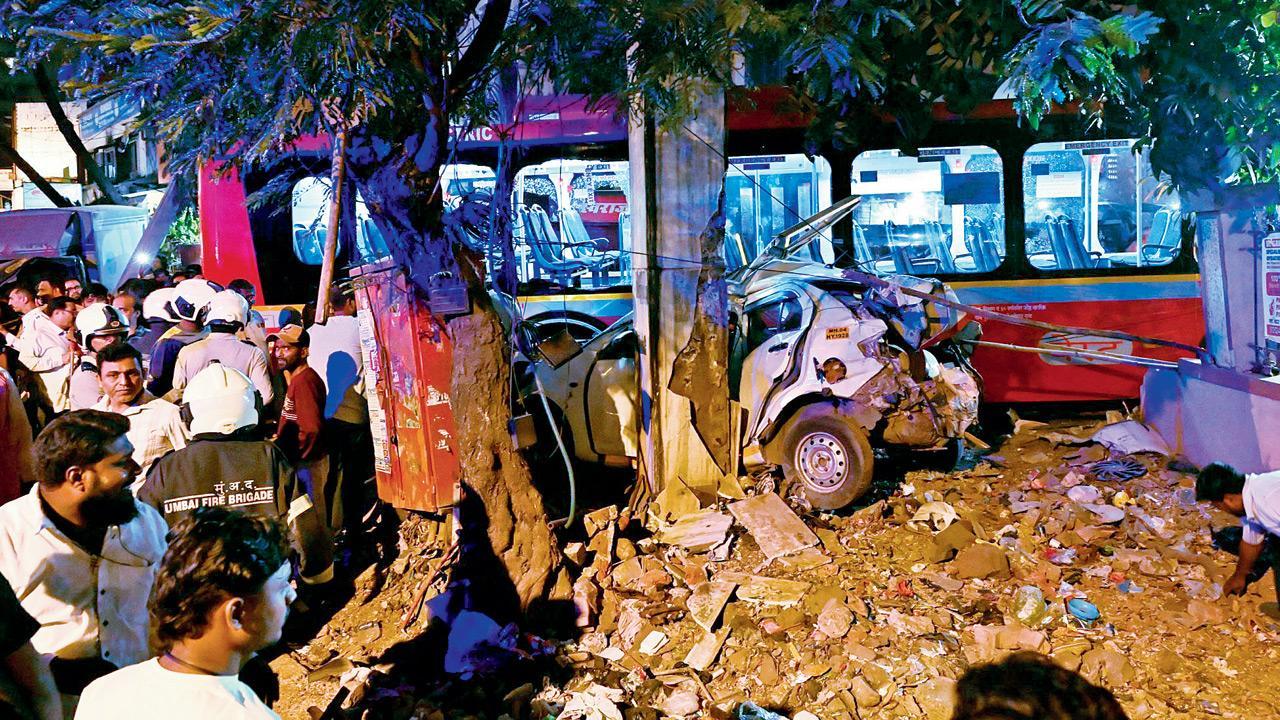In light of the recent BEST accident and the stampede situation at a theatre showing actor Allu Arjun’s film for which he was arrested, experts say, address systemic failures and ensure that accountability is fixed fairly

Eight died, and 49 were injured after the BEST bus ran through vehicles. Pic/Sayyed Sameer Abedi
The recent arrest of film actor Allu Arjun following a stampede at a cinema hall that resulted in the death of a woman and left her son seriously injured, raises questions about the application of "vicarious liability", a legal principle that holds one party accountable for the actions of another.
ADVERTISEMENT
If such a principle were applied consistently, then incidents like the recent BEST bus accidents, which claimed eight lives and left 49 injured, would demand that the general manager of BEST or the state itself be held responsible.
‘Vicarious liability’
“The tragic incident involving Allu Arjun brings to light the urgent need for judicial clarity on vicarious liability, particularly in high-profile cases involving celebrities. The higher courts must intervene to set clear precedents that delineate when vicarious liability applies and when it does not, ensuring that accountability is fixed fairly and proportionately,” said Mohini Priya, advocate on record, Supreme Court of India.
Merited scrutiny
“In cases involving public transport and railway accidents, there is often a tendency to prioritise immediate, visible actors—such as celebrities, drivers, or on-site personnel—as scapegoats while systemic failures go unaddressed. This approach risks creating a precedent where liability is driven more by publicity than by the principles of justice and causation. For instance, while the recent Mumbai BEST accident highlighted direct negligence by the driver, the lack of proper training and oversight by the employer pointed to deeper institutional failures that merited scrutiny,” she said.
Judicial clarity
“Higher courts play a crucial role in distinguishing between direct causation and systemic failures. They must establish clear guidelines on vicarious liability to prevent its selective or excessive application in high-profile cases. This will ensure that liability is fixed on those genuinely responsible—whether it is the celebrity, the organisers, or institutional entities—based on the evidence and not influenced by public outrage or media sensationalism,” she added.
Fix accountability
“If such a principle were applied consistently, then incidents like the recent BEST bus accidents, which have claimed eight lives and left 49 injured, would demand that the general manager of BEST or the state itself be held responsible,” said Advocate Godfrey Pimenta. “Similarly, every year, numerous lives are lost due to potholes on roads, open manholes, and unguarded pits dug for construction purposes. In such cases, justice demands that the municipal commissioner and other responsible officials be held vicariously liable for the resulting deaths and injuries caused by their negligence,” Pimenta said.
Additionally, in the eastern suburbs, many nursing homes operate illegally from ground-plus-one structures equipped with air-conditioning systems but lacking essential fire safety measures, including fire escape exits. The failure of the BMC to take action against these violations constitutes deliberate negligence,” Pimenta said
Extent of operation
“Vicarious Liability" as defined by the Black’s Dictionary is “Liability that a supervisory party bears for an actionable conduct of a subordinate or associate based on the relationship of the two parties. Understanding this would mean that there ought to exist the following elements: An actionable conduct (for criminal law, mens rea and actus reus). A supervisor-subordinate relationship, such as an employer-employee or principal-agent relationship,” said Advocate Floyd Gracias, counsel Supreme Court.
Volenti Vs. Vicarious
“Another interesting point to be highlighted, especially in the recent Allu Arjun case, is the fact that people voluntarily partake in such events. Therefore, the question of “Volenti Non Fit Injuria” applies. This means that a person cannot seek an injury claim that they have voluntarily exposed themselves to,” said Advocate Gracias.
Expert view
“Generally, a person is liable for his wrongful acts. In certain cases, however, under the law of torts, vicarious liability, that is the liability of one person for the act done by another person may arise, on account of a special relationship. A master could be held liable vicariously for such torts which are committed by the servant in the course of employment.
Depending on the fact whether the act is authorised or not by the master, there is a difference in how the liability will ensue under civil and criminal law. Under criminal law, the master is liable only for authorised acts along with the servant (if such an act is done in the course of employment). However, the master is not liable for unauthorised acts and only the servant is liable. However, under civil law, the master is liable for authorised acts as well as unauthorised acts done in the course of employment, along with the servant,” explained Solicitor Stuti Galiya.
Court directives overlooked
“The Supreme Court has on various occasions held that celebrities cannot be held vicariously liable for crowd mismanagement unless direct involvement is proven. The Indian Constitution guarantees equality before the law, and equal protection of the law. However, when laws are applied differently, there is increasing debate on responsibility and accountability, which erodes the common public’s faith in the justice/law enforcement system,” said Galiya.
 Subscribe today by clicking the link and stay updated with the latest news!" Click here!
Subscribe today by clicking the link and stay updated with the latest news!" Click here!







